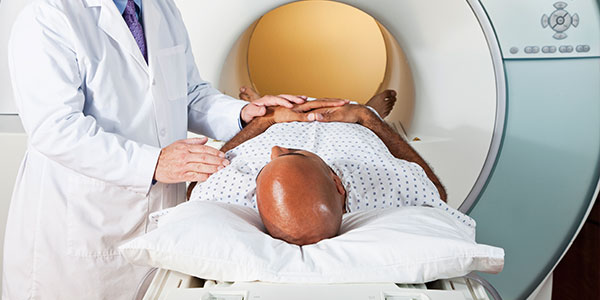Prostate cancer is one of the most common cancers diagnosed in American men. As with most cancers, if your prostate cancer is caught early, you have a good chance of recovery. Prostate cancer care teams in the Sutter Health network, including urologists, oncologists and surgeons, are highly experienced and actively seeking new, more effective treatments.
At Sutter’s 10 accredited cancer centers, we offer comprehensive diagnostic and treatment options for prostate cancer.

Diagnostics
Your specialist may conduct a variety of tests to diagnose prostate cancer, including:
- Prostate-Specific Antigen Blood Test — For this test, some levels of PSA are associated with a higher likelihood of prostate cancer. This screening test can be administered annually, usually beginning at age 50.
- Digital Rectal Exam — This exam sometimes finds cancers in men with normal PSA levels.
- Core Needle Biopsy — During a biopsy, small samples of tissue are removed using a needle guided by transrectal ultrasound (TRUS). A pathologist will assign the samples a Gleason score to predict how quickly the cancer will grow. This system of grading prostate cancer is based on how the tissue looks under a microscope.
- Diagnostic Imaging — CT, MRI with or without an endorectal coil, TRUS and bone scans all are used to diagnose prostate cancer and understand how far the disease has progressed.
Treatments
Your prostate cancer specialist will help you understand all of your treatment choices so you can make the one that is right for you. Services we offer include:
- Active Surveillance — Some cases of prostate cancer are not life-threatening, and your care team may recommend watchful waiting with regular follow-up.
- Surgery — A common cure for prostate cancer is to remove the entire gland and surrounding tissue in a radical prostatectomy; for early-stage cases, options include a laparoscopic radical prostatectomy using several small incisions or cryosurgery using extreme cold and TRUS for guidance.
- Radiation Therapy — Used in place of or with a prostatectomy, 3-D conformal therapy, intensity modulated radiation therapy (IMRT), volumetric arc therapy and prostate brachytherapy all minimize damage to healthy tissue.
- Hormone Therapy — To slow the growth of the cancer, hormone therapy limits the body’s ability to make male sex hormones.
- Immunotherapy — A treatment to boost the body’s immune system to attack cancer cells.
Services and Support
We understand that cancer patients may need services and support that go beyond clinical treatment, such as:
- Complementary Therapies — Serves the whole patient with pet therapy, integrative healing arts, guided imagery and other nontraditional therapies.
- Counseling — Serves the whole patient with financial, psychological and nutritional counseling as well as support groups.
- Nurse Navigators — These nurses can guide you through the sometimes confusing maze of cancer care specialists.













